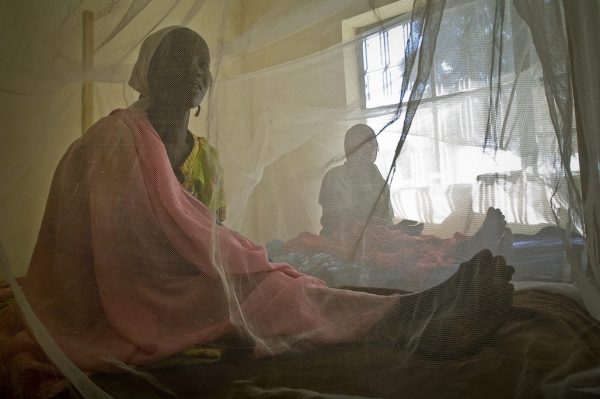by Victoria Griffin

She had a hand on her belly, swollen like a mosquito bite, sweating through her dirt-stained dress. The pummeling African sun was not nearly as harsh from behind my pew, standing in an air-conditioned church, and I could attest from the heaviness of her big, brown eyes that this place was much gentler to a white man like me than to a young, black girl—she couldn’t have been more than fifteen.
“Hello.” I let the page of my Bible fall like a dry leaf. The crackle of the page and my booming voice—my natural projection was good for a preacher, kept the kids awake during the dry parts—resounded through the empty church. “Is there something I can do for you?”
The girl stood between the pews, her limbs gathered under her shoulders, making herself very small. She looked to a painting of the Virgin Mary hanging behind the pulpit, then dropped her eyes to her feet. Half of her big toe was visible through a hole in her shoe.
I stepped out from behind the pulpit, suddenly aware of my black slacks, creased down the front. “Do you speak English?”
Her eyes looked up—her chin remained pinned to her collarbone. Her pupils were trembling. “Yes.”
Her voice was weak, her accent audible even in the single syllable. I stepped closer, towering over her like a tree over a flower. She was so small. “What’s your name?” Her eyes found mine and quickly darted away, back to the Virgin Mary. Her fingers grappled with each other below her belly. “How far along are you?”
“Seven months.”
“And do you have someone to help you? When the baby comes? Can you get to the hospital? Do you have a good place to live?”
She shook her head, slowly, like she might lose it. “I am on my own. But I have—we have AIDS.”
My eyes softened—I felt them slink back into my skull. I looked over the girl once more.
“Are you sure?”
Her eyes were on the ground, her shoulders slumped forward. “Yes, an American told me. At the clinic.” She rocked back and forth, heel to toe. Her lips were trembling. Her eyes were hidden, but I heard tears in her voice. “I never meant—never meant to kill my baby.”
“Of course you didn’t.” I reached out a hand, thought of placing it on her shoulder, then reeled it in like a fishing line. “You didn’t mean to get AIDS. It’s not your fault.”
She stopped rocking. Her hands fell to her sides. With her dark hair spilling over her limp neck she looked like she were dangling from a noose. “My mother died when I was very young. My sister raised me. She hawked fruit and bread in the street, and I helped when I was old enough. I told her we should beg for money. We would make more, and her fingers would not be raw from kneading. But she said no. My sister was good. She was kind and gentle and never spoke a harsh word to anyone. She was half-dead before she got malaria. Her body was thin and weak, and her spirit was broken. There was nothing left of her.” The girl took a breath and wiped her face. She raised her eyes to mine. “I would not die like that. Someone told me that having lots of sex gives you AIDS, and that AIDS will kill you. I found parties where men gave me alcohol, and they would play music and sometimes give me coffee in the morning when I woke up with my head hurting. And I thought that I would live this way and die, and it would hurt no one. But now…”
I watched her still lips, her sunken figure. After her words trailed off, she looked away from me, tried to hide her face. Sadness encircled her like the hula-hoop my daughter played with in our backyard—behind a seven-foot fence, where she was safe. I wasn’t breathing. Gulped in the air. It tasted bad.
“Here, sit down.” I moved a Bible off the seat of the nearest pew. It had that new book smell—we ordered them a month ago, but they only arrived last week. “I can get you resources, doctors, medicines. You and your baby, you’ll have a chance.”
She shook her head and straightened her spine. “No. I wanted to die. I am going to.”
“Please let me help you. Let me find someone who can—”
“No. No one can help.”
I pinched the bridge of my nose and exhaled a sour breath. “What can I do for you?” The question was much more honest than the one I’d asked when she’d walked through the door.
“I just want to know… I don’t know. I want to know something. What to expect? What to do?”
I shook my head like a dog shaking water from its fur. “Please, I can’t let you just die. Not without trying. They have medicines. There’s hope—”
“Not for me.” She stood up, her feet spread wide for support. “Not here.”
She was almost to the aisle before I stepped in front of her, blocking her path. Her eyes shone with defiance, briefly, but long enough for me to latch onto that strength.
“Don’t give up. Life is a gift. It’s always worth holding onto.”
She looked at me—not at my eyes, but over my trimmed blond hair, my clean clothes, my shaven face. She looked at my leather shoes and my hands, soft from turning pages all day.
She looked a long time, or perhaps it only felt that way to me. Then she stepped past me—my feet dragging my body out of her path. She stopped at the last pew and spoke without turning around.
“Some lives are not worth saving.”
Then she was gone, and I was left standing in an air-conditioned church, Mary staring down at me from her frame and Jesus from his cross. And I tried to cry, but I couldn’t. She was right.
For two months, I stood behind my pulpit and preached sermons about forgiveness and sin. I told my congregation stories about the Lord’s gracious provision and how they would be rewarded for faithfulness. I stood high above the pews, and I spoke words I no longer believed in.
For two months, I watched the clinic whenever I passed it. I watched people wander in and out, their hollow faces and skinny arms telling stories of a kind of despair I had never known.
Then I went in. It was Sunday, and I was taking a walk after church. The sermon had been about Jesus’s trials in the wilderness, the temptations of Satan, the prevailing of good over evil. I had recited the words in the tone they required—enthusiastic reverence—but I believed nothing I said. Those words may ring true somewhere, but not here, not in this place.
The sun was heavy— my body felt hot and heavy, as though buried in sand. There was sweat under my sleeves, rolling down my arms. I stepped into the building slowly, didn’t realize I was holding my breath until I tried to speak.
“Hello, I’m trying to find someone.”
The woman behind the front desk had dark skin and chipped, red nail polish. Her hair was half in a bun, half falling down her neck. She was digging behind the desk like a puppy pawing the ground. “One second.”
She called for help as she darted away, leaving me standing alone, leaning against the desk as though it were a walker. The place was bustling, the sound of papers and metal instruments harmonizing with coughs and shuffling footsteps. I turned and looked at some of the faces of patients sitting in fold-up chairs, but I quickly turned back. It was odd watching someone who wasn’t watching me and awkward watching someone who was. Or maybe I just didn’t like what I saw.
The lady was back. Her rubber shoes were silent over the tile. She had a clipboard in her hand, grabbed a few papers from a stack behind the desk and clipped them onto the wood.
She looked up. “Can I help you?”
“I’m trying to find someone.”
“Name?”
“I don’t know her name.”
She rested the clipboard against the desk. “Look, sir, we see a lot of patients in here. Way too many, actually. So there’s really nothing I can do if you don’t know—”
“She’s pregnant, and she has AIDS. The baby, too.”
She looked back and forth between my eyes. “Oh.” She tucked a lock of dark hair behind her ear. “That’s Ebele.” She opened her mouth as if to say more, but before she did her lips snapped together, and she dropped her gaze to her red fingernails tapping a beat against the desk.
“Has she been here? Has she had the baby?”
The woman sucked in a breath like it hurt. “Yes.”
“And is it… sick?” The word flew from my mouth like a rotten sunflower seed.
She nodded slowly. “The baby’s alive, in an orphanage across town. It won’t live long there. They don’t have access to the medicine he needs.”
“He?”
“Yes, he. Kwame.”
“An orphanage. So she…”
“She made it through the birth. Got to name him, hold him. It was two days later.”
“Was it—painful?”
She gazed at me from beneath her lashes as though looking under glasses rims. “Tell me, how did you know Ebele?”
“I didn’t. I mean, I met her once. She came into my church, told me her story. I tried to help her, but she wouldn’t let me.”
The lady nodded, picked up the clipboard. She didn’t care that I hadn’t helped Ebele. She didn’t care that my insides were rotting with guilt. She probably didn’t even care about that girl or that baby boy—they were just more sick kids.
She didn’t say another word, just walked away, clipboard by her hip. I scanned the faces around me one last time before walking out the door. So many faces. I knew none of them.
I stood in the street outside the clinic several minutes, watching people pass by. Any one of them could be walking to that orphanage right now. Any one of them could adopt little Kwame. He still had a chance.
A girl walked by. A white girl with blond hair. She looked just like my baby girl, if my daughter were six or seven years older. She was sweating like onions in a skillet, and she was holding her pregnant belly with both hands.
She couldn’t have been more than fifteen.
Before I thought about why I should or why I shouldn’t or what my wife might say or how much money per month this was going to cost me, I was standing in front of the orphanage. I had baby Kwame in my hands.
He was small and delicate, like the wispy pages of a Bible. I looked down at his soft skin, his limbs squirming gently, and I knew the difference between this baby boy and the Bible I had loved so much.
Kwame was real. He had two eyes to see the injustices of Africa. He had two ears to hear the terrible words spoken around him. He had a heart—beating so near mine—to feel the pain of it all, of this world that seemed to despise him. Most importantly, he had two hands with which he could change all that.
And so did I.
My hands had never looked as capable as they did while holding baby Kwame. He didn’t understand my “thank you” as we walked back to the house, but I did. I understood more than I ever had. I understood the person I was going to be.
My daughter loved him immediately. She was the one who researched the name and found Kwame Nkrumah, the great man who led his people to independence. It was my wife who suggested we sell the new Bibles to start a college fund for Kwame.
The congregation agreed.
“Thank you.”
Those were the last words I uttered behind the pew. The next day I resigned myself from the church, from religion, from my complacency with Africa.
Now, when I walk into the clinic, the receptionist smiles at me and stretches out her red nails to shake my hand. She takes the boxes of supplies I set on the counter, and she asks after my wife and daughter and son.
“He’s wonderful, just started walking.” The grin on my face is larger than any religion ever gave me. “I wish I had a picture of his mother, though. I wish he could see her.”
The receptionist taps her nail against her temple and grins. She ducks into the back for a moment and emerges with a snapshot in her hand. A black-skinned girl with dark hair and a belly swollen with the baby who would become my son. She is standing in the reception area, amid pain and terror and hopelessness.
In the photograph, she is smiling.
Victoria Griffin’s work has appeared in Calliope Nerve, the Fringe Magazine, Fiction 365, 6 Tales, and the Lyricist and is forthcoming in Apeiron Review and Down in the Dirt Magazine.
Photo credit: Darfurians refugees in Eastern Chad by European Commission DG ECHO is licensed under a Creative Commons Attribution 4.0 International License.





Danielle
This is exactly how it happens. Thank you.